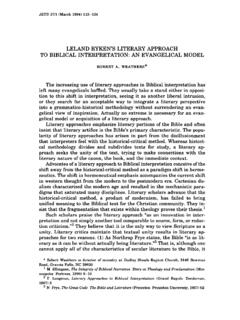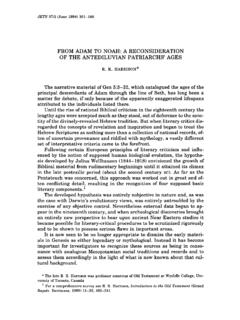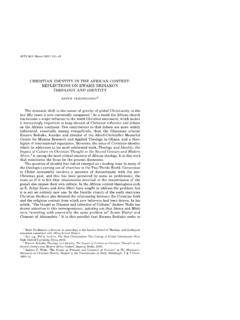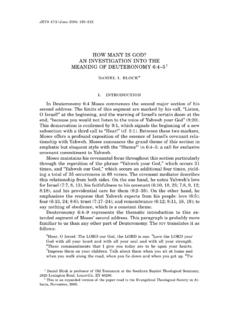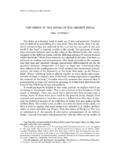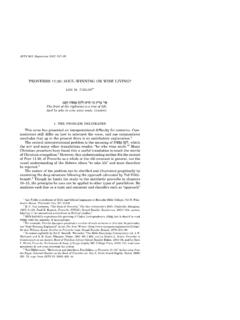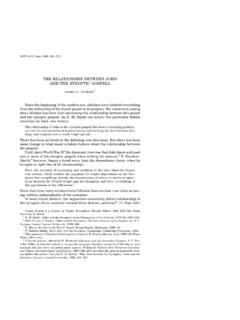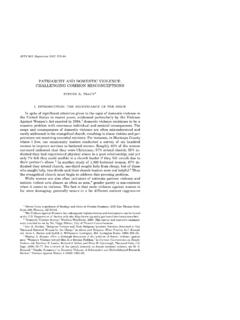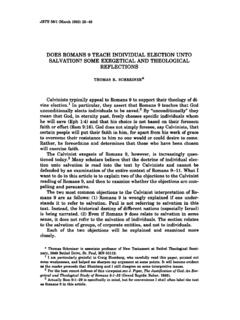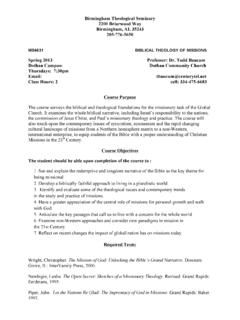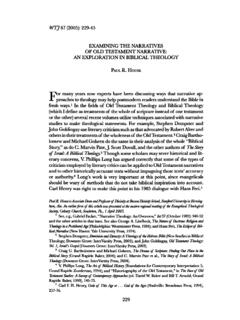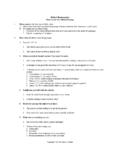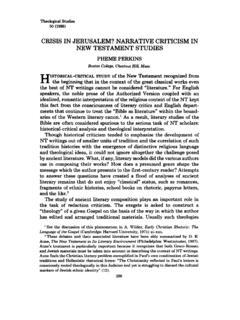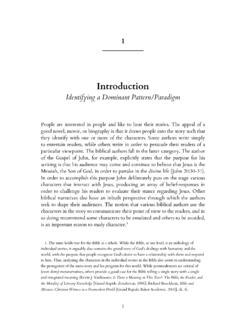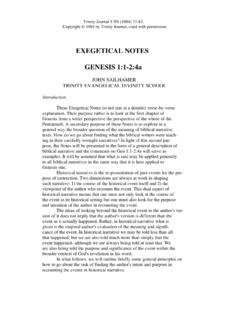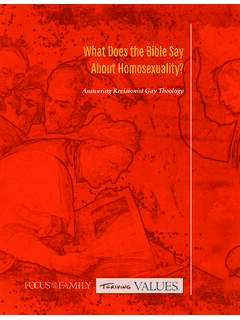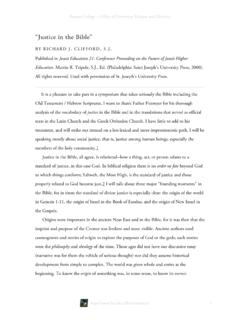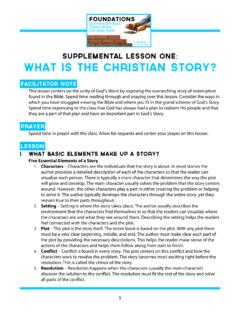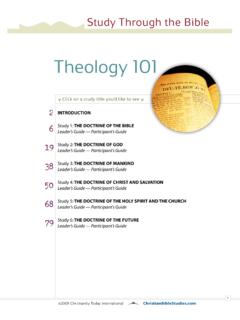Transcription of THE RECOVERY OF LUKE-ACTS AS “GRAND …
1 JETS 43/3 (September 2000) 405 415 THE RECOVERY OF LUKE-ACTS AS GRAND narrative FOR THE church S evangelistic AND edification tasks IN A POSTMODERN AGE WILLIAM J. LARKIN, JR.*I. INTRODUCTION One of the marks of postmodernism is the awareness of the loss of moder-nity s meta- narrative which gave western culture its coherence and sense ofpurpose. 1 One of the marks of classic evangelical hermeneutics is the loss ofBiblical narrative as the source of normative teaching. 2 One of the marksof evangelical revisioning of the biblical grand narrative is to concentrate onthe sweep of salvation history from creation to Jesus resurrection ascen-sion session and then skip to the consummation at his return.
2 3 Yet a keycomponent in biblical narrative , namely Acts, is more often than not over-looked. Since Jesus ministry and teaching are usually viewed synthetically,the distinctive contributions of the individual Gospel narratives are lost, inour case the Gospel of Luke. Yet, LUKE-ACTS genre, occasion, and purpose, andcontent and themes reveal that it is eminently quali ed to aid the church inits edi cation, and particularly its evangelistic tasks , in the postmodern paper will overview the postmodern approach to meta- narrative , assessthe current evangelical hermeneutical approach to normativity in narrative ,and note LUKE-ACTS role, or lack thereof, in evangelicals proposals of Biblicalmeta- narrative to the postmodern.
3 In the light of the current state of the dis-cussion in each of these arenas, this article will argue for LUKE-ACTS as a grand narrative which the church should use, not only for its own edi ca-tion, but also for evangelism in the postmodern context. II. POSTMODERN APPROACHES Postmodern approaches de ne meta- narrative as a story we tell ourselves,about what we do, and what is expected; it is a story that links our smallerstories together and gives us unity, social, psychological and intellectual. 4 1 Jean-Fran ois Lyotard, The Postmodern Condition: A Report on Knowledge , Vol. 10: Theoryand History of Literature (Minneapolis, MN: University of Minnesota Press, 1984) xxiv.
4 2 J. R. W. Stott, The Baptism and Fullness of the Holy Spirit (Chicago: InterVarsity, 1964) 8. 3 K. H. Kwok, Postmodernism and Christianity, available from ~khkwok/ ; J. R. Middleton and B. J. Walsh, Truth is Stranger thanit Used to Be: biblical Faith in a Postmodern Age (Downers Grove, IL: InterVarsity, 1995) chap. 5. 4 J. E. Faulconer, Term De nitions: De nitions of Some Terms in Postmodernism, accessed9/5/98; available from * William J. Larkin, Jr., is professor of New Testament and Greek at Columbia biblical Sem-inary and School of Missions at Box 3122, Columbia, SC ONE JOURNAL OF THE EVANGELICAL THEOLOGICAL SOCIETY 406 It is the grand overarching narrative which is regarded as really true, forit legitimates some knowledge, beliefs, and practices that explain our cul-ture in terms of origin and destiny and the power that sustains us.
5 At thesame time it marginalizes other knowledge, beliefs, and practices. BruceJanz gives these characteristics of meta- narrative , some of which may bepeculiar to modernity s meta- narrative . It totalizes reality (explains every-thing); is based on the rational self (instead of tradition); is the principle oflegitimation; is abstract; and is emancipatory. 5 According to Jean-Fran ois Lyotard, the modern grand narrative con-tained the themes: progressive emancipation of reason and freedom; progres-sive emancipation of labor; improvement of all humanity through progress ofcapitalist techno-science; and the salvation of humanity through the conver-sion of souls to the Christian meta- narrative of martyred love.
6 6 As Lyotardviewed the history of the last half of the twentieth century, he became con-vinced that one should adopt an incredulity toward metanarratives. 7 Modernist grand narratives had blown themselves up: Hegel/Nietzsche atAuschwitz (World War II); Marx at Budapest (1956); Liberal capitalism inParis (1968). In these violent, oppressive, even inhumane events, meta-narratives revealed both their epistemological and moral , grand narratives interpret reality in a totalizing manner, sothat they marginalize any individuals or groups that are di erent fromthe ideals of the narrative . The meta- narrative often promulgates the idealsembodied by the cultural elite.
7 In fact, the meta- narrative can legitimatethe totalizing violence that its adherents, those in power, may exerciseagainst those at the margins. In the case of Auschwitz, Budapest, andParis, the marginalized were the Jews, the freedom ghters, and the stu-dents. Lyotard concluded, We have paid a high enough price for the nostal-gia of the whole and the one .. The answer is: let us wage a war on totality,let us be witnesses to the unrepresentable; let us activate the di erencesand save the honor of the name. 8 Lyotard does not exempt the Christianmeta- narrative from such an indictment. In describing the modern mission-ary movement he says, The Christian West colonized the rest of the worldand raped their land, their labor, and their women in the name of martyredlove.
8 9 Indeed, Walsh and Middleton point out that any commending of theBiblical meta- narrative to the postmodern must address the accusation oftotalization and violence. 10 Lyotard also critiqued the coercive e ects of a particular theme of moder-nity s meta- narrative : progress fueling ever-advancing information technology. 5 Bruce Janz, RE: Modernity, 6 Jean-Fran ois Lyotard, The Postmodern Explained: Correspondence, 1982 1985 (Minneapo-lis, MN: University of Minnesota Press, 1993) 17. 7 Lyotard, Postmodern Condition xxiv. 8 Ibid. 81 82. 9 Lyotard, Postmodern Explained 17. 10 J. R. Middleton and B. J. Walsh, Facing the Postmodern Scapel: Can the Christian FaithWithstand Deconstruction?
9 Christian Apologetics in the Postmodern World (ed. T. R. Phillipsand D. L. Okholm; Downers Grove, IL: InterVarsity, 1995) 154. HALF LONG THE RECOVERY OF LUKE-ACTS AS GRAND narrative 407He nds technology fully complicit with narrativity and warns about the dan-gers of a generalized computerization of society: .. the growth of power istaking the route of data storage accessibility, and the operativity of informa-tion. 11 Mark Poster wonders whether the explosion of narrativity on theInternet, with many individuals telling their stories, will result in Lyotard sbest dream the promotion of a proliferation of the little narratives of post-modern culture or his worst nightmare: the invigoration of a developingauthoritarian are morally suspect, because they are epistemologicallysuspect.
10 For the postmodern, no meta- narrative is large and open enough toinclude the experiences and realities of all people. 12 Meta-narratives invari-ably serve to legitimate the power structures of some, and that is why thetrivialization and marginalization of the experiences of others foundationally, the postmodern with his understanding of the socialconstruction of knowledge sees a meta- narrative as simply the extension ofmetaphysical systems discredited for their realist claims. In the postmodernapproach, the articulation of knowledge about reality via language is repre-sentation which now self-consciously acknowledges its existence as re-presentation that is, as interpreting (indeed creating) its referent, not aso ering direct and immediate access to it.
